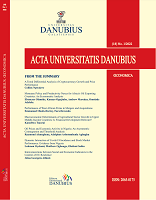Evaluating the Impacts of Change in Accounting Regulation on Financial Performance: A Univariate Testing and the Implications for the Nigerian Capital Market
Evaluating the Impacts of Change in Accounting Regulation on Financial Performance: A Univariate Testing and the Implications for the Nigerian Capital Market
Author(s): Adedeji Daniel GbadeboSubject(s): National Economy, Financial Markets, Accounting - Business Administration
Published by: Editura Universitară Danubius
Keywords: GAAP; IFRS; Financial performance indicators; Satterthwaite-Welch test; Wilcoxon/Mann-Whitney test;
Summary/Abstract: There is evidence that a change in accounting regulation can stimulate global access to a country’s capital market, thereby increase financial performance of firms. Corresponding to the change from the Generally Accepted Accounting Principles (GAAP) to the mandatory adoption of the International Financial Reporting Standards (IFRS) in Nigeria, this paper examines available information in order to confirm whether the change has created desired improvement in the firms’ performance after the adoption in 2012. Three financial performance indicators related to productivity (asset turnover, ATO) and profitability (returns on assets, ROA, and return on equity, ROE) are examined on univariate tests of significance differences in the mean, median and variance of sample for the ‘prior to’ IFRS adoption period (2003‐2011) and the post‐IFRS adoption period (2012‐2020). Accordingly, the Satterthwaite-Welch t-test, Wilcoxon/Mann-Whitney t-test and ANOVA-F-test are applied for the mean, median and variance, to verify the conjectured hypotheses. The results find thats light increase was perceived after adoption for average value of the ATO and ROA, but the considered tests are unable to indicate sufficient evidence to identify the improvement as significant. Contrary, the evidence supposes undesired significant decline in the ROE. The evidence finds the change in the variability, due to the transition to IFRS, for the indicators as significant. The findings have implications for the capital market and regulation; hence, the paper suggests that regulators should monitor firms’ compliance to the standards and extend the use of IFRS to other non-listed companies in Nigeria.
Journal: Acta Universitatis Danubius. Œconomica
- Issue Year: 19/2023
- Issue No: 3
- Page Range: 91-106
- Page Count: 16
- Language: English

